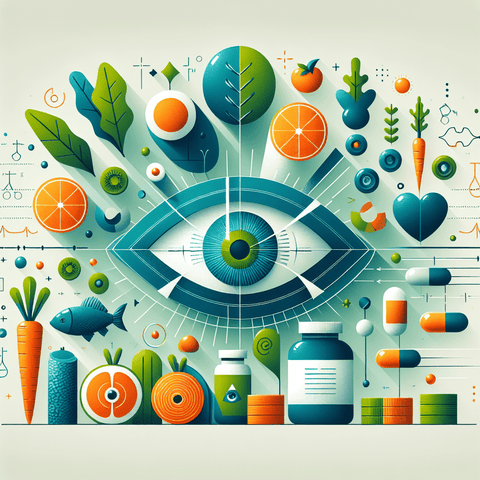Introduction
Your eyesight is one of the most vital senses, impacting how you engage with the world around you. Clear vision contributes not only to daily functionality but also to quality of life. However, maintaining optimal vision involves more than just correcting refractive errors with glasses or contact lenses. Behind the scenes, your diet and overall nutritional intake play a defining role in how well your eyes perform—and nutritional deficiencies can quietly impair vision, often manifesting as symptoms like blurry vision.
Blurry vision is a common complaint and can arise for many reasons. One often overlooked cause is a deficiency in critical vitamins and minerals that support eye health. From vitamin A’s essential role in retinal health to the antioxidative functions of vitamin C and zinc, poor nutritional intake can result in both chronic and temporary visual disturbances. These disturbances extend beyond occasional blur to more serious, long-term disorders if left unaddressed.
The purpose of this article is to explore which deficiencies are most likely to cause blurry vision and how to identify and correct them through dietary changes or nutritional supplements. We will dive deep into how vitamin imbalances affect the eyes, the types of vision-related symptoms you should watch for, and evidence-based ways to restore eye health naturally.
Vision Deficiency: Understanding Common Nutritional Factors Affecting Eyesight
A vision deficiency, in terms of nutritional health, refers to the deterioration or impairment of sight due to a lack of necessary nutrients. Our eyes require certain vitamins, minerals, and antioxidants to function optimally. When these are absent or insufficient in the diet, the metabolic and structural integrity of the eyes may suffer. Unlike acute eye injuries or genetic disorders, nutrition-related vision impairments develop gradually and are often preventable.
The human eye is a highly metabolic organ, consuming vast amounts of oxygen and generating free radicals in the process. Without adequate antioxidants—such as vitamins C and E, lutein, and zeaxanthin—oxidative stress can damage the retina, lens, and optic nerve. Simultaneously, deficiencies of essential fatty acids, particularly DHA (docosahexaenoic acid), can disrupt the structural composition of cellular membranes in the retina, leading to decreased function.
Over the years, numerous scientific studies have underscored the connection between nutrient intake and visual clarity. For example, the Age-Related Eye Disease Study (AREDS) found that high doses of antioxidants, zinc, and certain carotenoids could slow the progression of age-related macular degeneration. This evidence reiterates the importance of a well-rounded, nutrient-dense diet to support vision health.
Identifying and correcting nutrient deficiencies is thus essential for maintaining sharp vision. Unfortunately, modern dietary habits—characterized by processed foods, low fruit and vegetable intake, and high sugar consumption—often fall short. This is where supplementation, under professional guidance, can act as a supportive measure. Supplements rich in vitamin C, vitamin E, zinc, omega-3 fatty acids, and carotenoids such as lutein and zeaxanthin can offer an effective means of managing or preventing vision deficiency.
Understanding the root cause of blurry vision in the context of nutritional status provides you with the power to take corrective action. Evaluating your daily intake of key nutrients could reveal imbalances that, once addressed, improve not only your sight but also your overall health and well-being.
Vitamin Deficiency: The Role of Vitamin A in Maintaining Sharp Eyesight
Among all vision-related nutrients, vitamin A stands out as one of the most essential. Primarily known for its role in the visual cycle, vitamin A is necessary for the functioning of rhodopsin—a light-sensitive protein in the retina that enables vision in low-light conditions. When vitamin A levels are low, this biological process becomes impaired, potentially resulting in a condition called night blindness, one of the earliest signs of deficiency.
Blurry vision associated with vitamin A deficiency often arises from the degradation of the eye’s epithelial tissues. Without sufficient vitamin A, the cornea can become dry, leading to a condition called xerophthalmia. This can result in blurry or distorted vision and, in severe cases, can progress to ulceration, infections, and even blindness. Children and pregnant women are particularly vulnerable to vitamin A deficiency in regions where malnutrition is prevalent, but it can also occur in developed countries due to poor dietary choices, malabsorption syndromes, or restrictive diets.
Symptoms indicating a possible vitamin A deficiency include:
- Blurry or cloudy vision
- Difficulty seeing in dim or dark lighting
- Dry eyes and loss of tear production
- Frequent eye infections due to poor epithelial barrier function
Fortunately, correcting vitamin A deficiency is fairly straightforward through dietary interventions and supplementation. Excellent food sources of preformed vitamin A (retinol) include liver, eggs, dairy products, and fortified foods. Provitamin A carotenoids like beta-carotene, which the body can convert to active vitamin A, are found in sweet potatoes, carrots, kale, spinach, and orange or yellow fruits.
In cases where a dietary change alone is insufficient—such as absorption disorders or very low existing levels—vitamin A supplements may be beneficial. However, it’s crucial to seek professional advice, as vitamin A is fat-soluble and can accumulate in the body, leading to toxic effects like liver damage, bone thinning, and headaches. Moderation and balance are key. You can explore trusted sources of vitamin A-rich supplements and other supportive nutrients at Topvitamine, ensuring you meet your daily eye health needs safely and effectively.
Eye Health Issues: Preventing Age-Related Eye Conditions with Proper Nutrition
As we age, the risk of developing degenerative eye conditions increases significantly. Conditions such as age-related macular degeneration (AMD), cataracts, and glaucoma are commonplace, yet year after year, research emphasizes that proper nutrition can serve as a formidable defense against these ailments. Understanding how specific deficiencies contribute to these diseases can help you implement proactive strategies for preserving your vision.
One of the most well-researched areas is the link between antioxidant levels and age-related macular degeneration. AMD is characterized by the deterioration of the macula, the small central part of the retina responsible for sharp, detailed vision. Oxidative stress plays a central role in this degeneration. Nutrients such as vitamin C, vitamin E, zinc, lutein, and zeaxanthin function as powerful antioxidants that neutralize free radicals, reducing inflammatory responses in retinal tissues. Consistently low levels of these nutrients may accelerate the onset or worsening of AMD.
Cataracts—clouding of the lens—also have a nutritional component. Depletion of antioxidants like vitamin C leads to oxidative damage of lens proteins, while deficiencies in minerals such as selenium and magnesium have been correlated with increased cataract development. Moreover, nutrients like DHA, an omega-3 fatty acid found abundantly in fish oil, play structural roles in retinal cell membranes and may delay both cataracts and AMD. You can find specialized DHA & EPA omega-3 supplements here.
Adding vision-supportive nutrients to your diet can thus provide a multi-pronged defense. For example, lutein and zeaxanthin, found in leafy greens and yellow-orange vegetables, act as internal sunglasses by filtering harmful blue light. Zinc, found in lean meats and legumes, assists with transporting vitamin A from the liver to the retina, crucial for maintaining light perception functions.
Supplementation should be considered particularly for individuals with limited diets or those at increased risk for degeneration. Supplements containing a combination of essentials—often referred to as AREDS2 formulas—are backed by clinical trials and can meaningfully slow the progression of AMD. Always consult with an eye care or nutritional professional to tailor your approach. For high-quality options tailored to eye health, explore the range of supplements at Topvitamine.com.
Ultimately, preventing age-related eye issues begins with what goes on your plate today. Nutrient-rich choices create sustainable pathways to prolonged visual wellness, allowing you to age while maintaining visual independence and daily functionality.
Nutrient Deficiency Symptoms: Recognizing Signs of Inadequate Nutrition Impacting Eyesight
Recognizing the symptoms of nutrient deficiencies that affect eyesight can significantly improve your odds of prevention and early intervention. While blurry vision serves as a key indicator, it is often accompanied by an array of other manifestations that hint at underlying nutritional shortcomings. Knowing what to look for can place you on the path to restoring vision health before irreversible damage sets in.
The following are common symptoms associated with nutrient deficiencies impacting eye health:
- Dry, itchy, or burning eyes – often due to low intake of omega-3 fatty acids or vitamin A
- Poor night vision – frequently linked with vitamin A deficiency
- Frequent visual fatigue or eye strain – commonly associated with B-complex vitamin shortages, particularly B2 and B12
- Sensitivity to light or seeing halos – may arise from antioxidant deficiencies, particularly C and E
- Difficulty focusing or adjusting between light and dark – indicative of possible magnesium or vitamin A imbalances
These symptoms are sometimes misattributed to screen overuse, aging, or stress. However, they often reflect inadequate nutrient levels in your bloodstream or ocular tissues. A comprehensive eye assessment by an optometrist or ophthalmologist, paired with nutritional blood testing, can help identify the exact deficiencies at play. This is especially critical for at-risk populations like vegetarians (prone to B12 deficiency), the elderly (who often have reduced stomach acid impacting absorption), or athletes with higher micronutrient turnover.
Essential nutrients frequently found to be low in people with vision-related symptoms include:
- Vitamin A
- Vitamin C and E
- Omega-3 fatty acids (DHA and EPA)
- Vitamin B12
- Magnesium
To support those needs, you can browse magnesium-rich solutions that promote not only muscle and nerve function but also visual efficiency at Topvitamine.com. Likewise, sources rich in vitamin D (another vital nutrient increasingly linked to visual health) are available at Topvitamine.
Ultimately, understanding these visual cues as warning signs can inspire timely changes in diet or supplement habits. If you experience persistent visual discomfort that isn't corrected with glasses or contact lenses, it may be time to assess your diet and check for any nutritional gaps.
Visual Impairment Causes: How Nutritional Deficiencies Contribute to Long-Term Vision Loss
When nutritional deficiencies persist unchecked, the result can be more than just temporary blurry vision—it can lead to chronic and irreversible eyesight decline. Long-term vision loss represents one of the most devastating consequences of poor nutrient intake, especially when the deficiency damages eye tissues that do not regenerate easily.
For instance, prolonged vitamin A deficiency can lead to corneal ulceration and scarring, forming permanent blind spots or complete blindness. Similarly, insufficient intake of antioxidants such as vitamin C, vitamin E, and selenium intensifies oxidative damage in lens and retinal tissues, accelerating cataract formation and retinal thinning—two irreversible consequences.
A lack of omega-3 fatty acids, particularly DHA, can impair signal transmission in the retina and optic nerve, diminishing sharp vision capabilities. DHA makes up a significant protein-lipid layer within the retina and plays a vital role in photo-transduction (light signal conversion into vision). Continued insufficiency degrades this delicate infrastructure, causing both structural and functional impairments over time. Find high-quality DHA supplements optimized for eye health at Topvitamine.
However, not all vision disturbances in nutritionally-deprived individuals lead to irreversible outcomes. If detected early, many vision symptoms can be reversed or halted through targeted interventions. This includes addressing underlying gastrointestinal malabsorption issues that prevent nutrient absorption or introducing more bioavailable forms of essential vitamins and minerals.
The distinction between temporary and permanent vision loss often resides in the duration of the deficiency. While vitamin A-related night blindness can be reversed in early stages, once retinal tissue is scarred, the damage is no longer treatable through nutrition alone. Thus, early detection and action are paramount.
In conclusion, nutritional planning should feature prominently in your vision care routine. Supplements and fortified foods can help bridge the gap where dietary intake falls short, but the goal should always be to prevent damage before it occurs. Consulting healthcare professionals for an individualized supplement plan is strongly recommended for anyone experiencing persistent vision disturbances not explained by refractive errors.
Continue reading in Part 2/2...


